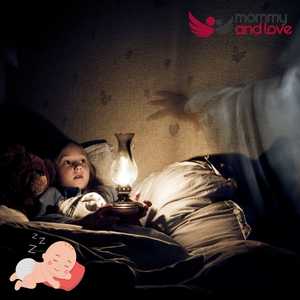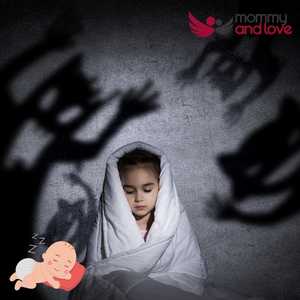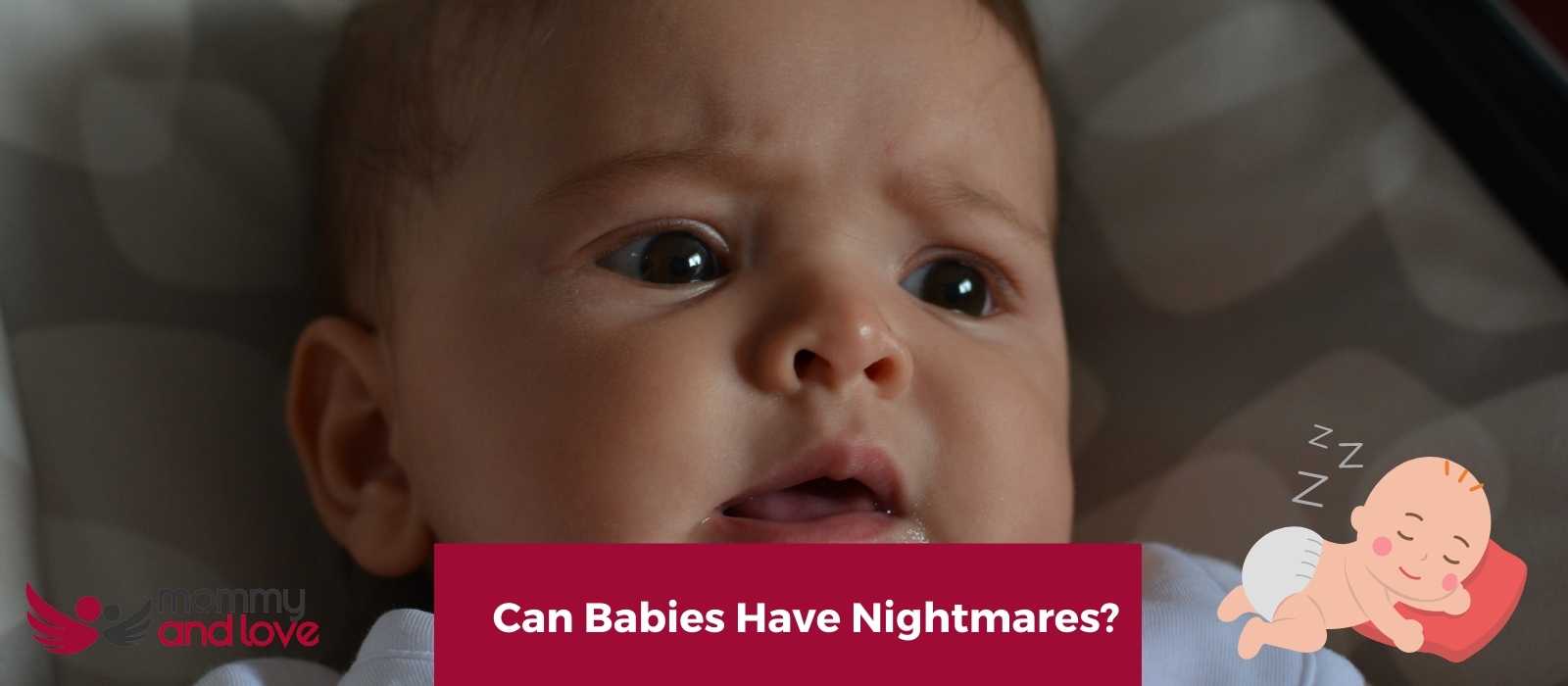Do babies have nightmares? This is a question that many parents ask, especially if their child is having a bad dream. Nightmares can be frightening for both children and adults, so it’s natural to want to do everything possible to make them go away.
No, babies cannot have nightmares. However, from the age of about 18 months, they can have night terrors and from the age of about 2 years, toddlers can experience nightmares. When babies cry out in their sleep before the age of 18 months it is usually a sign that they are hungry, are teething or need a diaper change.
Affiliate Disclaimer: As an Affiliate, we earn from qualifying purchases.
Nightmares vs Night Terrors

There is a big difference between night or sleep terrors and nightmares in children.
Night terrors usually happen during the first few hours of sleep and are more common in babies or toddlers. They may cry, scream, or thrash around in bed.
Babies typically experience night terrors for a shorter duration than adults or children. Night terrors usually last for about 30 minutes to an hour in babies. However, some infants may experience night terrors for a longer period of time
Babies don’t usually remember the event afterwards. Most babies who experience night terrors will grow out of these sleep disturbances by the time they reach toddlerhood.
Nightmares, on the other hand, can happen at any time during sleep. They are more common in school-age children and usually involve scary dreams that the child can recall upon waking.
Nightmares are often caused by stress or anxiety and can be a reaction to something that happened during the day. Night terrors, on the other hand, seem to happen for no reason.
Most children will outgrow nightmares and night terrors as they get older.
When Do Babies Start Having Nightmares?
It’s tough to say when exactly babies start having nightmares, as it varies from child to child. However, most experts agree that nightmares usually begin around the age of 18 months. Before this age, babies typically don’t have the cognitive ability to understand concepts like fear or danger.
So why do toddlers and young children seem to have nightmares more frequently than adults? One theory is that their developing minds are simply more prone to anxiety and fear. Another possibility is that they’re still learning how to process and make sense of all the new information they’re taking in on a daily basis.
If your child has frequent nightmares, then monitor them in a diary. Talk to your child about each one, and reassure them that they are just a dream and perfectly normal. Monitor their overall sleep levels.
How Do I Know if My Baby Is Having a Nightmare?

There are a few signs that may indicate that your baby is having a nightmare. For example, if your baby wakes up screaming or crying, this may be a sign that they were experiencing a bad dream.
Additionally, if your baby seems scared or anxious after waking up, this may also be an indication that they had a nightmare.
Babies often squeal at night, or make many noises in sleep and these are nothing to be concerned about. Sleep terrors in a baby are not usually bad dreams until they are aged over two.
Why Do Children Have Nightmares?

Nightmares are a type of sleep disorder that can occur in children. They are usually characterized by frightening dreams that can cause a child to wake up feeling scared or anxious. Nightmares can be caused by various things, such as stress, anxiety, or trauma.
Most nightmares happen during the second half of the night when REM sleep (rapid eye movement) is more prevalent. It is not uncommon for children to have nightmares after watching a scary movie or hearing a frightening story.
Nightmares are generally not harmful and most children will outgrow them. However, if nightmares are frequent and causing significant distress, it may be worth talking to a doctor or sleep specialist. Treatment options may include cognitive-behavioral therapy or medication.
The first step is to keep a detailed sleep diary monitoring your child’s nightmares, the length, and frequency and if there are any patterns in the daytime leading up to the night terrors nightmares.
What Causes Nightmares?
Most children have nightmares at some point in their lives. While nightmares can be upsetting, they usually don’t cause long-term problems. Nightmares are most common in young children and usually go away as children get older.
Roughly half of children aged 3-6 experience occasional nightmares, some for just a short period of time, others for a couple of years.
There are many different theories about what causes toddler nightmares. Some experts believe that they’re a normal part of child development. Others believe that they’re a sign of underlying psychological issues.
Common Causes
Common causes of occasional nightmares may be overtiredness, sudden noises when in a deep sleep, needing the toilet or just feeling unwell, watching a scary film or something that made your child anxious.
Traumatic Event
It’s also believed that nightmares may be caused by trauma or stress. If a child has experienced traumatic events, such as the death of a loved one, or even just starting a new school they may have nightmares about it.
Medical Associations
Certain medications prescribed to children can cause a nightmare, if you think this is the case talk to your doctor to see if an alternative can be prescribed.
Stress
Nightmares can also be triggered by stressors in a child’s life, such as bullying or family conflict, or even a natural disaster can cause them to feel scared and exhibit unusual behaviors.
Family History
Nightmares tend to run in families so if there is family history with close family members suffering from nighttime fears, then your child might be more prone to them.
Many children spend the day absorbing everything around them, often they cannot process this, so they are often processed in their world of make believe which come to fruition during the rem stage of sleep.
How to Help Kids With Nightmares
If your child is having nightmares, there are some things you can do to help them.
- If your child is old enough, you can encourage them to talk about their nightmares. This can help them to process and understand what’s causing them.
- Help them to understand that it is not real, don’t dismiss your child’s worries or their nighttime fears.
- Create a relaxing bedtime routine for your child. A routine will help them feel more secure and may prevent nightmares from occurring.
- Try to avoid letting them watch scary movies or TV shows before bed.
- Encourage your child to keep a dream journal to document their dreams.
- Make sure your child is getting enough sleep. The sleep foundation recommends that toddlers need between 11-14 hours of sleep a day.
- Consider getting a night light which can help your child cope, remember children have vivid imaginations so having a light can help assure them the three-headed monsters aren’t in the dark corner!
- When your child wakes from a nightmare, it’s important to encourage them to fall asleep again back in their own bed. Helping your child settle, keeping calm and in their own room is an important part of ‘sleep medicine’ in sleep disorders.
If your child is having persistent or severe nightmares, it’s important to speak to a doctor or mental health professional. They can help you to identify any underlying issues and develop a plan to address them.
If stress or trauma is the underlying cause, try to reduce stress in their life. This may mean making changes like simplifying their schedule or getting them counseling if they’re dealing with a tough situation.
How to Get Rid of Night Terrors in Babies
There are a few things that you can do to help your baby if they suffer from night terrors. First, try to keep a regular sleep schedule for your baby. A consistent bedtime routine will help to prevent night terrors and will help your baby sleep better.
Secondly, make sure that your baby’s bedroom is dark and quiet. This will create a calm environment for your baby to sleep in.
Third, if your baby does wake up from a night terror, try to comfort them and help them back to sleep. Do not try to wake them up as this can make the night terror worse and getting more sleep is probably the best thing to do! If you are co-sleeping, then just soothe them to go back to sleep.
Do Babies Have Bad Dreams?
Of course, it’s also possible that babies just have good dreams and bad dreams like the rest of us. We may never know for sure what goes on inside their heads when they’re asleep, but it’s clear that dreams are an important part of our lives, even from a very early age.
For one thing, dreams are often a way for our brains to process and make sense of the events of the day. So if a baby has had a particularly stressful or upsetting day, it’s possible that they could have a bad dream about it.
Another possibility is that babies could have nightmares due to separation anxiety. If a baby is used to having their parents close by and suddenly finds themselves alone in a dark room, it’s not surprising that they might have a nightmare about it.
The Bottom Line on Can Babies Have Nightmares?
Young babies, under the ages of 18 months cannot have nightmares. They may experience night terrors, but this is usually nothing to worry about.
When they reach age two, it’s important to remember that most toddlers have occasional nightmares, and there isn’t always a reason for them. However, if your toddler is having frequent nightmares or severe nightmares, it’s worth trying to figure out what might be causing them.
In some cases, there may be an easy fix like getting more sleep or establishing a bedtime routine. But in other cases, it may be necessary to speak to a doctor or mental health professional to address any underlying issues.

This article was written by Sandra Baker – full time writer and the mother of four amazing kids (including twins!)
She’s also a breastfeeding counselor and has spent years helping new parents learn how to care for their children. When she’s not writing or caring for her children, Sandra likes to spend time reading and taking walks with her husband.




